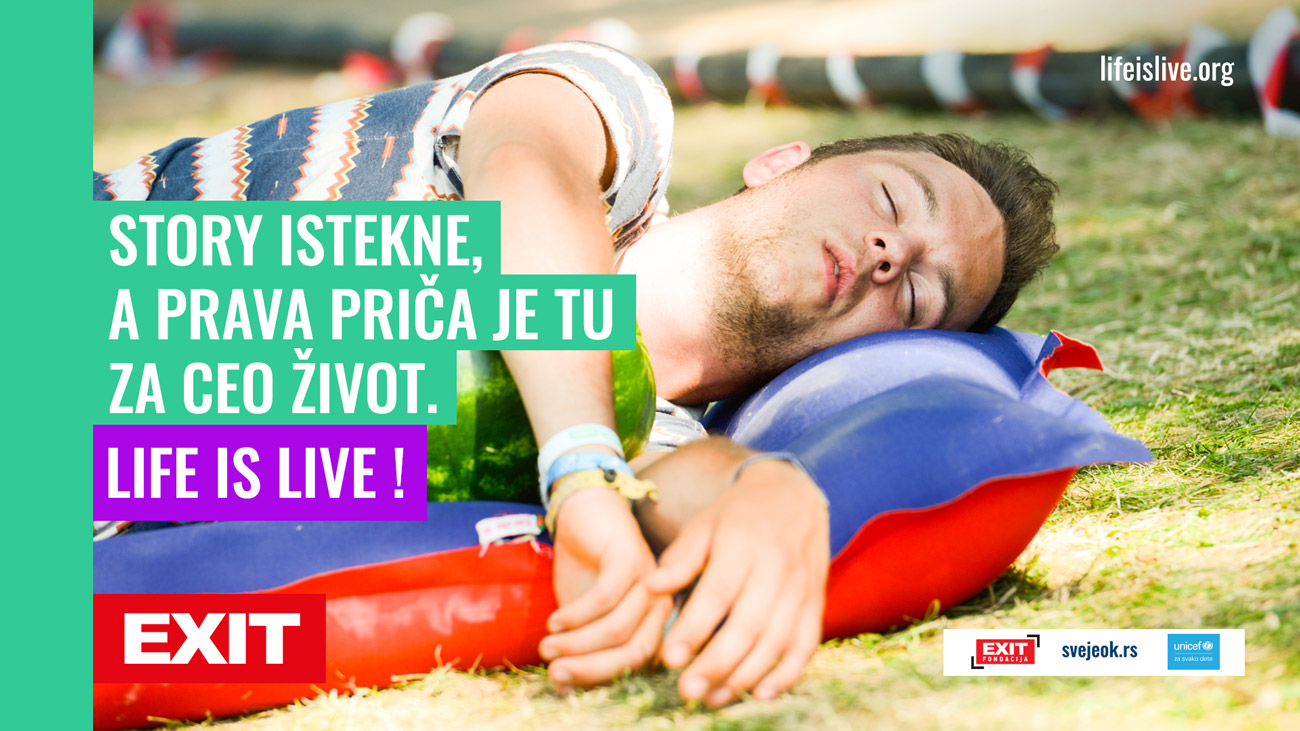This issue is of utmost importance today, as impaired mental health is a leading cause of illness, disability, and social exclusion, while authentic conversation, closeness, and connection are vital resources for its stability.
For this reason, with the support of the marketing agency McCann Belgrade, EXIT and UNICEF aim to highlight the immense significance of in-person contact for mental health, particularly among young people in this digital age. The first phase of the campaign, titled “Life Is Live,” focuses on digital addiction and urgently draws attention to its alarming scale. Although technology makes our daily lives and communication much easier, the line between its beneficial and harmful use is increasingly thin.
It is estimated that billions of people worldwide suffer from digital addiction and that it now surpasses all other forms of addiction combined. Currently, about 6.8 billion mobile phones are in use worldwide, and data shows that over 65% of the global population exhibits signs of nomophobia — addiction to these devices! The current estimate of the average time spent in front of mobile, computer, and TV screens amounts to an astounding 20 years of one’s life, while the average mobile phone user touches their device 2,617 times a day!
Statistics indicate that a typical adult spends around eight hours and 45 minutes a day in front of a screen and that more than half of mobile phone owners never switch off their phones – 24 hours a day, seven days a week, 365 days a year.
“A true story lasts a lifetime” is the slogan for the campaign’s first phase. Its goal is to highlight all those irreplaceable moments we spend with our loved ones and by ourselves, which make life authentic, and can only be truly experienced in person.
On the other hand, excessive screen time, using of social media, watching various forms of content, and playing video games, is associated with numerous mental health issues and disorders. Digital identity and the virtual world seem to have become more important than real life, especially among younger people.
“We’ve partnered with EXIT Foundation to use one of the world’s largest festivals as a platform to draw attention and send messages to young people about the importance of connecting, nurturing positive relationships, and taking care of mental health. Good mental health and psychosocial well-being are essential for all of us to thrive and live a fulfilling life,” emphasizes Deyana Kostadinova, UNICEF Representative in Serbia.
“As terrifying as the realization of widespread digital addiction might seem, it simultaneously offers a chance for insight and awareness. At our events, we commonly see phones held high, but we also witness socialization, new encounters, hugs, authenticity, closeness, touch, and live contact. That’s why we believe finding a balance is not only possible but necessary. However, to get there, we must all become aware of our situation,“ the EXIT foundation declares.
Alienation, loneliness, depression, anxiety, digital violence and abuse, feelings of unimportance, and an unstable self-image are everyday topics in psychotherapy. Creating a complete digital identity as opposed to a real one, the illusion of connectedness and friendship without real closeness has led to young people being lonelier, more depressed, and more anxious than perhaps ever before. The campaign is primarily aimed at them, but also at anyone interested in the topic of mental health and, relatedly, digital addiction.
They all have access to the lifeislive.org website, which will be filled with educational content throughout this long-term campaign. The campaign also directs to the UNICEF and OPENS platform svejeok.rs, which contains helpful information about young people’s problems and proven ways to solve them. The SVE JE OK platform offers young people educational and interactive texts, and if they feel the need, they can anonymously and freely talk to professionals via chat, phone, or arrange online counseling within the SUPPORT section.
Through this collaboration, EXIT and UNICEF strive to support young people in maintaining mental health and creating a balance between their real and virtual lives. The website lifeislive.org will be available throughout this multi-year campaign to all those willing to learn, offer help, or seek assistance. After all, a true story lasts a lifetime.






